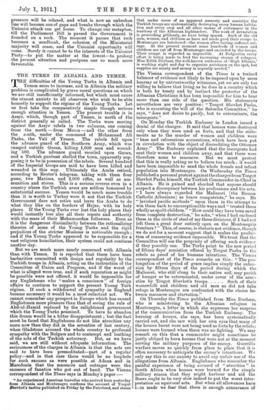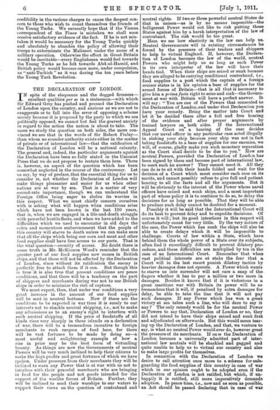THE TURKS IN ALBANIA AND YEMEN. T HE difficulties of the
Younc, Turks in Albania and Yemen seem to increase, and in Albania the military problem is complicated by grave moral questions on which we are still insufficiently informed, but which must cause the utmost anxiety to all observers who wish to be able honestly to support the regime of the Young Turks. Let us first take the comparatively simple though serious enough situation in Yemen. The present trouble is in Assyr, which, though part of Yemen, is north of the district generally so called.. The Turks were moving against the Assyr rebels in two columns, one coming from the north —from Mecca — ana the other from the south, under the command. of Mohammed. Ali Pasha, the Vali of Yemen. The rebels fell upon the advance guard of the Southern Army, which was camped outside Gezan, killing 1,000 men and wound- ing 500. The advance guard recoiled upon Gezan, and a Turkish gunboat shelled the town, apparently sup- posing it to be in possession of the rebels. Several hundred of the Imperial troops are said to have been killed and wounded in this way. Ultimately the Arabs retired, according to Reuter's telegram, taking with them four guns, two Maxims, and 2,000 rifles, as well as am- munition and stores. This is a serious reverse even in a country where the Turkish arms are seldom honoured by substantial success. Yemen would be much more trouble than it is worth to Turkey were it not that the Turkish Government dare not retire and leave the Arabs to do what they like on the borders of Hejaz, with its holy places. If the Young Turks ever lost the holy places they would instantly lose also all their repute and authority with the mass of their Mohammedan followers. Even as it is the dangerous dissimilarity between the rationalizing theories of some of the Young Turks and the rigid prejudices of the stricter Moslems is noticeable enough ; and if the Young Turks appeared to be responsible for a vast religious humiliation, their system could not continue another day.
But we are much more nearly concerned. with Albania than with Yemen. It is reported that there have been barbarities committed with design and regularity by the Turkigh troops in Albania, acting on the instruction of the Committee of Union and Progress, and if the worst of what is alleged. were true, and if such reparation as might be possible were not offered, it would. be impossible for any Englishman who " makes a conscience " of foreign affairs to continue to support the present Young Turk regime. If such a withdrawal of sympathy in England became necessary it would. be a most reluctant act. We cannot remember any prospect in Europe which has caused. Englishmen more pleasure than that of seeing the rule of Abd-ul-Hamid replaced by the enlightened government which the Young Turks promised. To have to abandon this dream would be a bitter disappointment ; but the fact must be faced that Englishmen do not like atrocities any more now than they did in the seventies of last century, when Gladstone aroused the whole country to profound sympathy with the Bulgars and to contempt and loathing of the acts of the Turkish autocracy. But, as we have said, we are still without adequate information. The seriousness of the charges in Albania is that the acts are said to have been premeditated—part of a regular policy—and in that case there would be no loophole for such excuses as were possible at Adana and in Macedonia that the massacre and outrages were the excesses of fanatics who got out of hand. The Vienna correspondent of the Times says in Monday's paper :— ' "An experienced American traveller who arrived here yesterday from Albania and Montenegro confirms the account of Torgut fihevket's tactics published on Friday by the Vat eriand, and states
that under cover of an apparent amnesty and armistice the Turkish troops are systematically destroying every human habita- tion and every crop and all other means of sustenance in the territory of the Albanian highlanders. The work of devastation is proceeding pitilessly, no lives being spared. Such of the old men, women, and children as have not made good their escape to Montenegro are butchered—the women after having suffered out- rage. At the present moment some hundreds of women and children are cut off from Montenegro and encircled by the troops. Their escape is regarded as impossible. At Podgoritza every effort is being made to feed the increasing stream of refugees. Miss Edith Durham, the well-known authoress of High Albania,' is working night and day to organize assistance on the spot, but supplies are scanty and money is urgently needed."
The Vienna correspondent of the Times is a trained balancer of evidence not likely to be imposed upon by mere hearsay or by untrustworthy witnesses, yet we are only too willing to believe that living as he does in a country which is both by treaty and by instinct the protector of the Albanian Christians it has been impossible for him to hear more than one side of the question. His statements nevertheless are very positive : "Torgut Shevket Pasha, who is executing the will of the Salonika Committee," he says, " does not desire to pacify, but to exterminate, the insurgents."
On Monday the Turkish Embassy in London issued. a denial of the charges. It said that houses were destroyed only when they were used as forts, and that the state- ments as to the murder of women and children were " base and calumnious accusations, which have been put in circulation with the object of discrediting the Ottoman Army." The Embassy explained that the insurgents had sent their women and children away, and that there were therefore none to massacre. But we must protest that this is really asking us to believe too much ; it would have been impossible to send the whole female and infant population into Montenegro. On Wednesday the Times published a personal protest against the charges from Torgut Shevket Pasha himself, the Turkish Commander-in-Chief in Albania. He is pained and shocked that anyone should suspect a discrepancy between his professions and his acts. " I have always regarded the Malissori [the Roman Catholic Albanians] as brave compatriots," he says. He " lavished pacific methods " upon them in the attempt to win them back to unexceptionable ways and " treated them wholly as spoilt children." "How could they have been saved from complete destruction," he asks," when I had enclosed them in the circle of steel of my three divisions, if I had not left them a great door entirely open on the Montenegrin frontiers ? " This, of course, is rhetoric not evidence, though we do not for a moment suggest that it makes the produc- tion of reassuring evidence impossible. We trust that the Committee will see the propriety of offering such evidence if they possibly can. The Turks point to the new period of fifteen days' armistice offered by Torgut Pasha to the rebels as proof of his humane intentions. The Vienna correspondent of the Times remarks on this : " The pro- longation of the period of grace implies simply the exten- sion by fifteen days of the period during which the Malissori, who still clung to their native soil, may perish of hunger or be exterminated, under cover of the arm:- stice by Torgut Shevket's troops Such of their womenfolk and children and old men as did not take refugr, in Montenegro are confronted with the choice be- tween massacre and starvation."
On Thursday the Times published. from Miss Durham, who is ministering to the Albanian refugees in Montenegro, a letter in which she expresses her surprise at the communication from the Turkish Embassy. The burning of houses, she says, has been systematically carried. out, and she saw with her own eyes that many of the houses burnt were not being used as forts by the rebels; houses were burned when there was no fighting. We may remark on this that a commander might sometimes be justly obliged to burn houses that were not at the moment serving the military purposes of the enemy. Guerrilla warfare moves so quickly from place to place that it is often necessary to anticipate the enemy's intentions. We only say this in our anxiety to avoid any unfair use of the allegations from Albania. Englishmen who remember the painful experience of being accused of " atrocities " in South Africa when houses were burned for the simple military reason that they might harbour and aid the Boers ought to be very slow indeed to put the worst inter- pretation on equivocal acts. But when all allowances have JK.en made we fear that there is enough appearance of credibility in the various charges to cause the deepest con- cern to those who wish to count themselves the friends of the Young Turks. We earnestly hope that if the Vienna correspondent of the Times is mistaken we shall soon receive satisfactory evidence of the fact. If he is not mis- taken it would be necessary for the Young Turks quickly and absolutely to abandon the policy of allowing their troops to exterminate the Malissori under the name of a. military operation. Otherwise the effect in Great Britain would be inevitable—every Englishman would feel towards the Young Turks as he felt towards Abd-ul-Hamid, and British policy would become once more, under compulsion, as " anti-Turkish " as it was during the ten years before the Young Turk Revolution.















































 Previous page
Previous page